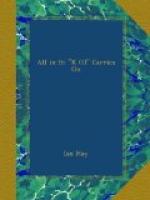Meanwhile, their most pressing need was for something to eat. To be sure, every man had gone into action that morning carrying his day’s rations. But the British soldier, improvident as the grasshopper, carries his day’s rations in one place, and one place only—his stomach. The Hairy Jocks had eaten what they required at their extremely early breakfast: the residue thereof they had abandoned.
About midnight Master Cockerell, in obedience to a most welcome order, led the remnants of his command, faint but triumphant, back from the reserve line to a road junction two miles in rear, known as Dead Dog Corner. Here the Battalion was to rendezvous, and march back by easy stages to St. Gregoire. Their task was done.
But at the cross-roads Number Nine Platoon found no Battalion: only a solitary subaltern, with his orderly. This young Casabianca informed Cockerell that he, Second Lieutenant Candlish, had been left behind to “bring in stragglers.”
“Stragglers?” exclaimed the infuriated Cockerell. “Do we look like stragglers?”
“No,” replied the youthful Candlish frankly; “you look more like sweeps. However, you had better push on. The Battalion isn’t far ahead. The order is to march straight back to St. Gregoire and re-occupy former billets.”
“What about rations?”
“Rations? The Quartermaster was waiting here for us when we rendezvoused, and every man had a full ration and a tot of rum.” (Number Nine Platoon cleared their parched throats expectantly.) “But I fancy he has gone on with the column. However, if you leg it you should catch them up. They can’t be more than two miles ahead. So long!”
IV
But the task was hopeless. Number Nine Platoon had been bombing, hacking, and digging all day. Several of them were slightly wounded—the serious cases had been taken off long ago by the stretcher-bearers—and Cockerell’s own head was still dizzy from the fumes of a German gas-shell.
He lined up his disreputable paladins in the darkness, and spoke—
“Sergeant M’Nab, how many men are present?”
“Eighteen, sirr.” The platoon had gone into action thirty-four strong.
“How many men are deficient of an emergency ration? I can make a good guess, but you had better find out.”
Five minutes later the Sergeant reported. Cockerell’s guess was correct. The British private has only one point of view about the portable property of the State. To him, as an individual, the sacred emergency ration is an unnecessary encumbrance, and the carrying thereof a “fatigue.” Consequently, when engaged in battle, one of the first (of many) things which he jettisons is this very ration. When all is over, he reports with unctuous solemnity that the provender in question has been blown out of his haversack by a shell. The Quartermaster-Sergeant writes it off as “lost owing to the exigencies of military service,” and indents for another.




